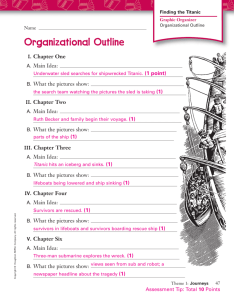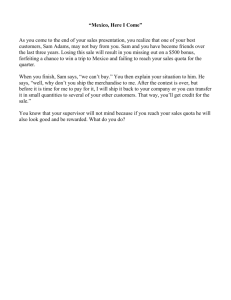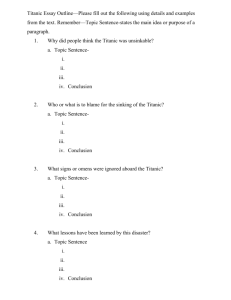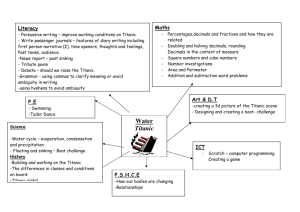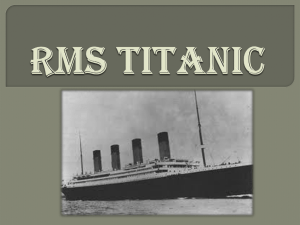Cause and Effect Analysis Guidelines
advertisement
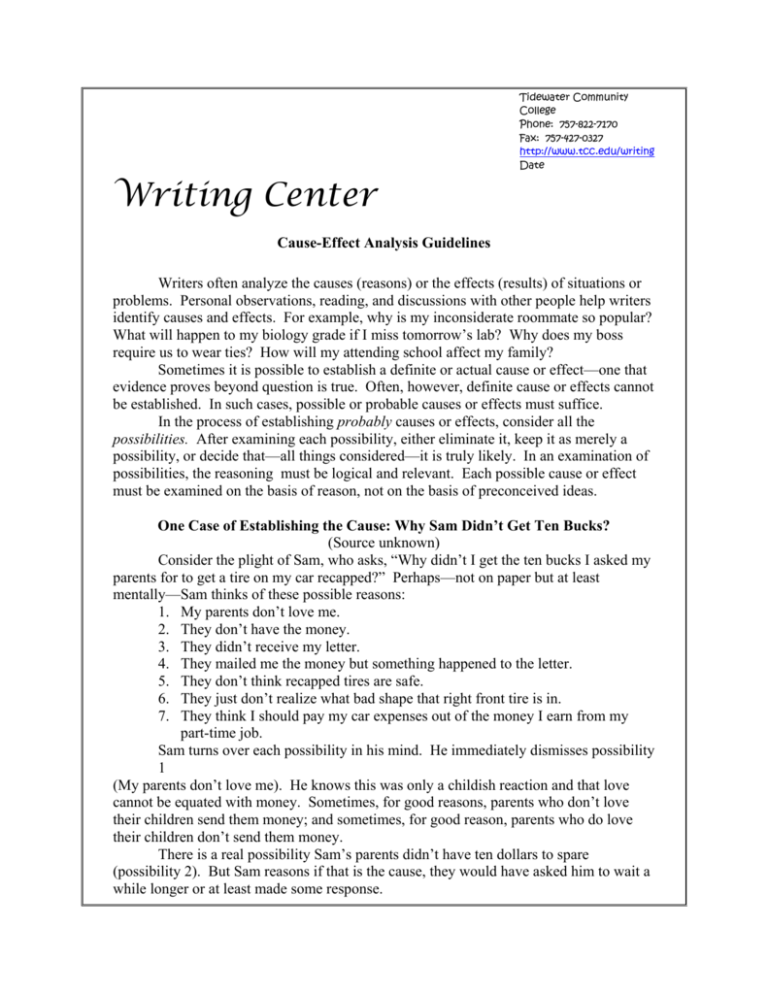
Writing Center Tidewater Community College Phone: 757-822-7170 Fax: 757-427-0327 http://www.tcc.edu/writing Date Cause-Effect Analysis Guidelines Writers often analyze the causes (reasons) or the effects (results) of situations or problems. Personal observations, reading, and discussions with other people help writers identify causes and effects. For example, why is my inconsiderate roommate so popular? What will happen to my biology grade if I miss tomorrow’s lab? Why does my boss require us to wear ties? How will my attending school affect my family? Sometimes it is possible to establish a definite or actual cause or effect—one that evidence proves beyond question is true. Often, however, definite cause or effects cannot be established. In such cases, possible or probable causes or effects must suffice. In the process of establishing probably causes or effects, consider all the possibilities. After examining each possibility, either eliminate it, keep it as merely a possibility, or decide that—all things considered—it is truly likely. In an examination of possibilities, the reasoning must be logical and relevant. Each possible cause or effect must be examined on the basis of reason, not on the basis of preconceived ideas. One Case of Establishing the Cause: Why Sam Didn’t Get Ten Bucks? (Source unknown) Consider the plight of Sam, who asks, “Why didn’t I get the ten bucks I asked my parents for to get a tire on my car recapped?” Perhaps—not on paper but at least mentally—Sam thinks of these possible reasons: 1. My parents don’t love me. 2. They don’t have the money. 3. They didn’t receive my letter. 4. They mailed me the money but something happened to the letter. 5. They don’t think recapped tires are safe. 6. They just don’t realize what bad shape that right front tire is in. 7. They think I should pay my car expenses out of the money I earn from my part-time job. Sam turns over each possibility in his mind. He immediately dismisses possibility 1 (My parents don’t love me). He knows this was only a childish reaction and that love cannot be equated with money. Sometimes, for good reasons, parents who don’t love their children send them money; and sometimes, for good reason, parents who do love their children don’t send them money. There is a real possibility Sam’s parents didn’t have ten dollars to spare (possibility 2). But Sam reasons if that is the cause, they would have asked him to wait a while longer or at least made some response. Perhaps his parents did not receive his request (possibility 3). Maybe they mailed him the money but something happened to the letter (possibility 4). Either of the letters could have gotten lost in the mail. To his knowledge, however, none of his other letters has ever gotten lost. As Sam thinks about possibility 5 (They don’t think recapped tires are safe), he dismisses it. He remembers that the family car has two recaps on it. Possibility 6 (They just don’t realize what bad shape that right front tire is in) could certainly be a true statement. But Sam realizes that his parents could be aware of the condition of the tire and still have reasons not to send the money. The more Sam considers possibility 7 (They think I should pay my car expenses out of the money I earn from my part-time job), the more this seems the likely reason. After all, Sam had promised his parents that if they would help him buy a car, he would keep it up. Furthermore, in his excitement of owning a car at long last, he had cautioned his parents to ignore any requests for car money, no matter how desperate they sounded. So, as Sam carefully considers each possibility, he comes to the conclusion that the probably reason he did not receive the money is that his parents expect him to pay for his car expenses. Whether the conclusion that is reached is the definite cause or the more probable cause of a situation, it must be arrived at through logical investigation, as in Sam’s case. A conclusion, to be logical, must be based on reliable evidence, relevant evidence, sufficient evidence, and an intelligent analysis of the evidence. Reliable, Relevant, Sufficient Evidence Reliable evidence comes from verifiable sources such as personal experience and observation, knowledgeable individuals, scholarly books, journal articles, and other reliable references. Relevant evidence is information that is clearly and unquestionably related to the situation under discussion and the controlling idea of the composition. Sufficient evidence means enough information with no significant details omitted. Evidence that is reliable, relevant, and sufficient must be analyzed intelligently. The meaning and significance of each individual piece of information and of all the pieces of information together must be considered, if the most plausible conclusion is to be reached. Illogical and Insufficient Causes and Effects Do not assume that a preceding event causes a following event. If Tom helped find the owner of a lost puppy yesterday and today made an A on a math test, his kindness to the puppy was not the cause of his making the A. The two events are not logically related as a cause and effect. Do not oversimplify a situation by thinking it has only one cause or effect when it has several causes or effects. For example, Chris claims she lost her job because she was late for work twice in a month, ignoring the many warnings about sloppy typing, overlong lunch hours, and surly telephone manners. Or Kelly says that not tuning up his car will result in his saving $400, ignoring the probability that he will also have problems with his alternator and electrical system. Procedures for Cause and Effect Analysis Analysis of causes and effects may be used as part of a paragraph or it may be the approach to a whole essay. Generally, causal or effect analysis should be divided into four sections: 1. Statement of the problem/situation/condition/effect. a. Clearly present the situation to be analyzed. b. If applicable, give the scope and limitations of the situation (as in reporting the causes of traffic accidents involving fatalities at the Highway 76-Justice Avenue intersection from January 1 to July 1, 1973. c. Give the assumptions, if any, on which the analysis or interpretation of facts is based (as in assuming that the new machine which is not working properly today was correctly installed and serviced last month). d. Unless the order of the presentation requires otherwise, present a clear thesis statement identifying the conclusions that have been reached. 2. Explanation or report of the examination of the situation a. If applicable, give the methods of investigation used, for instance, reading, observation, personal experience, or consultation with knowledgeable people. b. Consider in sufficient detail all possible causes and effects; eliminate improbable causes and effects. Brainstorming, outlining, and other prewriting strategies are helpful for generating lists of possibilities. c. If the actual causes or effects can be established, identify them and support them with sufficient, appropriate evidence. d. If the actual causes or effects cannot be established, give probably causes and effects with sufficient supporting evidence. e. Fully explain supporting information and clarify its relevance to your thesis. f. If necessary, especially in a long essay, divide the subject into parts and analyze each part individually. 3. Organize the information around a logical pattern or order. a. The topic may suggest moving from the less important to the more important, or vice versa. b. The topic may suggest using a time order of what happened first, second, third, and so on. c. The topic may suggest moving from the more obvious to the less obvious. d. The topic may suggest going from the less probable to the more probable. e. The nature of the presentation may suggest some other order. 4. A conclusion that reflects the purpose of the analysis. a. If the purpose of the analysis is to give the reader a general knowledge of a cause-effect situation, summarize the main points or comments on the significance of the situation. b. If the analysis is a basis for decisions and actions, summarize the main points, comment on the significance of the analysis, and make recommendations. Suggested Topics for Cause-Effect Compositions These topics are suggested for personal essays in which writers analyze the causes or effects of situations with which they are familiar from personal involvement, observation, or study. Topics for specialized classes might be based on class discussion, lecture, and required reading. Researched papers require scrupulous documentation. Check with your teacher about the exact requirements of your assignment. 1. The influence on your life of one of the following: a parent, particular book or movie, particular friend or relative, particular member of the clergy or teacher or doctor, particular neighborhood or community, particular job or boss. 2. The influence on your life of a particular decision you have made, for example, to go to college, to go to a particular college, to change jobs, to change residences, to change family status. 3. The causes or effects of a problem such as overeating, sloppiness, or poor financial management. 4. The causes or effects of a major purchase such as a personal computer, microwave oven, automobile, or house. 5. The causes or effects of a personal fear, of specific values or standards in your life, of attainment or loss of religious faith or self-esteem, of inefficient study habits, of success or failure at a particular task. 6. The causes or effects of the popularity (or decline in popularity) of a particular fashion or trend. 7. The causes or effects of a particular invention in relation to your life, for example, toothbrush, cellophane tape, shower massages, remote control units, off-road vehicles, snowboards, or in-line skates. Model Essays When That Great Ship Went Down Student essay (source unknown) On the evening of 14 April 1912, on its maiden trip, the “unsinkable” luxury liner the Titanic, struck an iceberg in the freezing waters of the North Atlantic. Within a few hours the ship sank, taking with it some fifteen hundred lives. Why did so many people perish, particularly when there was another ship within ten miles? Subsequent investigation by national and international agencies shows that the Titanic crew was small and insufficiently trained, that the ship did not have sufficient lifesaving equipment, and that international radio service was inadequate. One reason so many people perished in the Titanic tragedy was that the crew was small and insufficiently trained for such an emergency. In the face of grave danger, evidently the crew of the Titanic was simply not able to meet the situation. Many of the lifeboats left the ship only half full and others could have taken on several more people. The passengers were not informed of their imminent danger upon impact with the iceberg, investigation suggests, and the officers deliberately withheld their knowledge of the certain sinking of the ocean liner. Therefore, when lifesaving maneuvers were finally begun, many passengers were unprepared for the seriousness of the moment. Further indication of poor crew leadership is that when the Titanic disappeared into the sea, only one lifeboat went back to pick up survivors. Another reason so many people lost their lives was that the ship was not properly equipped with lifeboats. Although millions of dollars had been spent in decorating the ship with palm gardens, Turkish baths, and even squash courts, this most luxurious liner afloat was lacking in the essential of lifesaving equipment. Records show that the Titanic carried only sixteen wooden lifeboats, capable of carrying fewer than twelve hundred persons. With a passenger and crew list exceeding twenty-two hundred, there were at least a thousand individuals unprovided for in a possible sea disaster—even if every lifeboat were filled to capacity. Undoubtedly, however, the primary reason that so many of the lives aboard the Titanic were lost is that international radio service was inadequate. Within ten miles of the Titanic was the Californian, which could have reached the Titanic before she sank and could have taken on all of her passengers. When the Titanic sent out emergency calls, near midnight, the radio room operator of the Californian had already gone to bed. The crew member, however, was still in the radio room and picked up the signals. Not realizing that they were distress signals from a ship in the immediate vicinity, the crew member decided not to wake up the radio operator to receive the message. At the same time there were no international maritime regulations requiring a radio operator to be on duty around the clock. Had there been a more adequate international radio system, regardless of the Titanic’s small and insufficiently trained crew and it insufficient lifesaving equipment, probably those fifteen hundred lives could have been saved when that great ship went down. The Destructive Power of Alcohol TCC student essay Alcohol is an affliction that alters the lives of millions of Americans daily. People who are not directly involved with alcoholics probably do not realize how destructive a condition alcoholism is. Because my father was addicted to alcohol for several years, his life was almost destroyed. Alcoholism was devastating for his career and his family. One important part of my father’s life almost ruined by alcohol was his career. Being a master sergeant in the Air Force, my father was certainly lucky his alcohol problem didn’t become intense until he was assured a pension. Serving just over twenty years in the military, he was forced to retire because of his faltering duty performance, not to mention an unpleasant phone call he made to an officer while drunk. More than once I can remember him getting up late for work because he had had too much to drink the night before. I only pitied the poor fool who had to work with him and smell his breath. Another area of my father’s life almost wrecked by his alcoholism was his family. Many times I can remember my father violently bursting into the house after all the bars closed and waking everyone up, including a few neighbors. He then proceeded to inspect the kitchen, which my three brothers and I were in charge of cleaning, always finding something out of place that he could shout at us about. The verbal abuses he gave us, we soon grew quite used to, but he sometimes let his rage get out of hand. For example, he once threw my oldest brother through a plate-glass window. Also I can remember him holding a pistol to my little sister’s head. I was hurt most when he beat my mother while she tried to defend us, bruising her face and arms. The family lived in terror that one of us would be seriously injured. Until the public realizes that alcoholism is a disease and not just a social disorder, addicts like my father will go untreated and will continue corrupting their own and others’ lives. Fortunately, my father received treatment that enabled him to gain control of his life and save his relationship with his family. Without that medical treatment he would surely have killed either one of us or himself. The Impact of TV on American Politics by Emmet John Hughes The New York Times, November 11, 1968 Has the power of television-now dramatized by the devices of debate—really revolutionized the democratic process? Is the change more apparent than real? For better or for worse? So stunning are the factors of size of audience and speed of communication on the grand scale that the very rhythm of political life does seem revolutionized. And a case can be at least plausibly argued that American political history has been decisively affected, these last eight years, by this revolution in technique. Three witnesses—three of America’s political giants—can be summoned to lend evidence to that case. Richard M. Nixon in 1952 dramatically appeared on national television to explain to all the homes of America how he had financed his home, his career, his whole life—in a performance that made Checkers the nation’s most famous dog since F. D. R.’s Fala. Hours, even minutes before that telecast, Mr. Nixon stood an excellent change of making history as the first candidate on a national ticket ever to be stricken from the lists in midcampaign as an insufferable embarrassment to his own party. So nearly definite was this stern verdict of the party leaders that it is not enough to note that television remarkably served the man: It saved him. No other kind of apologia—nothing but television, with impact so massive and instantaneous, could have spared Mr. Nixon swift retirement to the little town of Whittier, California, whose residents thronged the streets, just a few weeks ago, to hail the 1960 Presidential nominee. Dwight D. Eisenhower in 1956 spent an agonizing late spring in slow recovery from major surgery, following his earlier heart attack. His decision to run for re-election trembled in doubt for weeks; even the thought of it would have made a weaker man tremble. But it is hardly conceivable that even he would have elected to wage a national campaign were it not for the fabulous facilities of television to ease and simplify the ordeal. John F. Kennedy in 1960 found his spring offensive for the Democratic nomination fatefully committed to the primary battle for West Virginia. His most ominous problem was the state’s massive and pervasive hostility to a Catholic candidate. Only the most full and personal kind of campaign—directly reaching and affecting tens of thousands—could counter popular passions so diffuse, so widespread. And only television made such an effort conceivable. Three different men, in three different years: for all of them, the road to this political moment took its crucial turning around the same extraordinary fact. Towering personalities and dramatic incidents aside, the impact of television on American political life can be reckoned in a number of other ways. These are ways less crisply clear, yet perhaps more seriously historic and lasting. First, TV makes political life itself more fluid and more volatile. Men can surge or stumble with astonishing speed—either triumphing over obscurity or tripping over a hasty or graceless public word or gesture. And issues can become as mercurial as individuals: A single performance before a sufficiently massive audience can virtually end an issue or precipitate one. In the golden days of radio, the nightmare of performers in the studio was the mumbling of some indiscretion or vulgarity a moment before the microphone was dead. Now the politician almost lives before a live “mike” and camera. His world is tapped. Second, TV forces much of the backstage machinery of political life to endure the same exposure. Conventions tend to become not national caucuses of politicians, but public spectacles, designed less for deliberation (or dealing) among the participants than the delight (or entertainment) of an audience. It is at least debatable whether this makes the event itself more sober or merely more contrived. It is equally debatable whether the effect upon the audience is one of visual education, in a serious sense, or one of visual enjoyment just a notch or two above the level of the peepshow. What is not in doubt is the fact that the people see more. Third, TV dramatically tends to nationalize political life. The citizen who can watch and hear Presidential candidates from his easy chair feels understandably less excitement than his father at the prospect of a “live’ appearance in the local auditorium of a Congressman or even a Senator. Local political clubs—as centers of political life— tend to suffer and sag in appeal. The firing of local partisan zeal, then, requires ever more prestigious names—as close to the top of the ticket as one dare demand. Ultimately, this could dictate, of course, greater dependence of all local tickets upon the national ticket. Fourth, TV can strikingly shift political advantage towards those officeholders with easiest access to a national medium; these are national officeholders. It seems hardly an accident that 1960 has been notable for the fact that three of the four candidates on the national tickets come from the U.S. Senate—traditionally inferior to state governorships as sources of national candidates—while the fourth candidate, Henry Cabot Lodge, has enjoyed unique exposure on national television. In the future of television, it would seem doubtful if the most distinguished governor, whatever his record or his personality, could come close to national candidacy without finding a way, first, to establish his identity as nationally as Washington leaders. Copyright for this document is held by the Writing Center and Grammar Hotline of Tidewater Community College, Virginia Beach Campus. It has been written, revised, and/or edited by staff paid to perform that work for the college; therefore, the rights are retained by the college. 11/26/03
